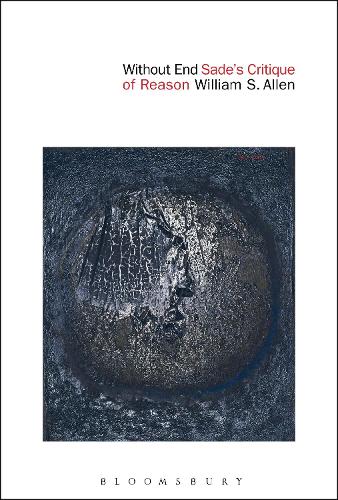
Without End: Sades Critique of Reason
(Hardback)
Available Formats
Publishing Details
Without End: Sades Critique of Reason
By (Author) Dr William S. Allen
Bloomsbury Publishing PLC
Bloomsbury Academic USA
28th December 2017
United States
Classifications
Tertiary Education
Non Fiction
Literary studies: c 1600 to c 1800
Literary studies: general
Western philosophy: Enlightenment
Literary theory
128.33
Physical Properties
Hardback
224
Width 152mm, Height 229mm
467g
Description
The reputation of the Marquis de Sade is well-founded. The experience of reading his works is demanding to an extreme. Violence and sexuality appear on almost every page, and these descriptions are interspersed with extended discourses on materialism, atheism, and crime. In this bold and rigorous study William S. Allen sets out the context and implications of Sades writings in order to explain their lasting challenge to thought. For what is apparent from a close examination of his works is the breadth of his readings in contemporary science and philosophy, and so the question that has to be addressed is why Sade pursued these interests by way of erotica of the most violent kind. Allen shows that Sades interests lead to a form of writing that seeks to bring about a new mode of experience that is engaged in exploring the limits of sensibility through their material actualization. In common with other Enlightenment thinkers Sade is concerned with the place of reason in the world, a place that becomes utterly transformed by a materialism of endless excess. This concern underlies his interest in crime and sexuality, and thereby puts him in the closest proximity to thinkers like Kant and Diderot, but also at the furthest extreme, in that it indicates how far the nature and status of reason is perverted. It is precisely this materialist critique of reason that is developed and demonstrated in his works, and which their reading makes persistently, excessively, apparent.
Reviews
Combining philosophical and literary methods, Allen reads Sades pornographic works in historicist fashion, analysing them in tandem with materialist philosophy and sentimental fiction (notably with Denis Diderot) Allen has written an important book. He demonstrates how Sade equated language and the body to advance his libertine philosophy and shows the subversive intersections between sentimentalism and materialism in eighteenth-century thought. Complex and sometimes dense, the analysis contributes substantially to how we understand the meaning and intentions behind Sades language and approach. -- Sean M. Quinlan * French Studies *
More than 200 years after their authors death, the outrageous fictional writings of the Marquis de Sade continue to repel and fascinate in equal measure. Numerous are the moderns, from Adorno to Bataille, Blanchot to Horkheimer, Klossowski to Lacan, Pasolini to P. Weiss and iek, who have sought to take the measure of Sades monstrous radicalism and account for the destructive negativity of his thinking. In this impressively original and thought-provoking new study, William S. Allen explores in incisive and intriguing fashion the philosophical stakes of Sades uncompromising materialism, and probes anew the lessons of Sades intellectual legacy for the contemporary world. * Leslie Hill, Emeritus Professor in French Studies, University of Warwick, UK *
An enlightening study not just of Sades materialism but also of its reception among French and German intellectuals in the 20th century. Allen offers rigorous and erudite readings of some of Sades most thoughtful and thought-provoking readers, from Adorno to Blanchot, and from Weiss to Pasolini. * Will McMorran, Reader in French & Comparative Literature, Queen Mary University of London, UK *
The most significant monograph of the year ... thorough, impactful, and contemporary. * The Year's Work in English Studies *
Author Bio
William S. Allen is an independent researcher and a librarian at the University of Southampton, UK. He is the author of Ellipsis: Of Poetry and the Experience of Language after Heidegger, Hlderlin, and Blanchot (2007) and Aesthetics of Negativity: Blanchot, Adorno, and Autonomy (2016).
